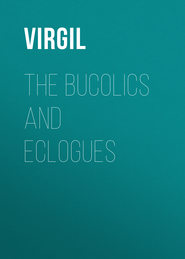По всем вопросам обращайтесь на: info@litportal.ru
(©) 2003-2025.
✖
The Georgics
Настройки чтения
Размер шрифта
Высота строк
Поля
Gat sorrow's increase, that an evil blight
Ate up the stalks, and thistle reared his spines
An idler in the fields; the crops die down;
Upsprings instead a shaggy growth of burrs
And caltrops; and amid the corn-fields trim
Unfruitful darnel and wild oats have sway.
Wherefore, unless thou shalt with ceaseless rake
The weeds pursue, with shouting scare the birds,
Prune with thy hook the dark field's matted shade,
Pray down the showers, all vainly thou shalt eye,
Alack! thy neighbour's heaped-up harvest-mow,
And in the greenwood from a shaken oak
Seek solace for thine hunger.
Now to tell
The sturdy rustics' weapons, what they are,
Without which, neither can be sown nor reared
The fruits of harvest; first the bent plough's share
And heavy timber, and slow-lumbering wains
Of the Eleusinian mother, threshing-sleighs
And drags, and harrows with their crushing weight;
Then the cheap wicker-ware of Celeus old,
Hurdles of arbute, and thy mystic fan,
Iacchus; which, full tale, long ere the time
Thou must with heed lay by, if thee await
Not all unearned the country's crown divine.
While yet within the woods, the elm is tamed
And bowed with mighty force to form the stock,
And take the plough's curved shape, then nigh the root
A pole eight feet projecting, earth-boards twain,
And share-beam with its double back they fix.
For yoke is early hewn a linden light,
And a tall beech for handle, from behind
To turn the car at lowest: then o'er the hearth
The wood they hang till the smoke knows it well.
Many the precepts of the men of old
I can recount thee, so thou start not back,
And such slight cares to learn not weary thee.
And this among the first: thy threshing-floor
With ponderous roller must be levelled smooth,
And wrought by hand, and fixed with binding chalk,
Lest weeds arise, or dust a passage win
Splitting the surface, then a thousand plagues
Make sport of it: oft builds the tiny mouse
Her home, and plants her granary, underground,
Or burrow for their bed the purblind moles,
Or toad is found in hollows, and all the swarm
Of earth's unsightly creatures; or a huge
Corn-heap the weevil plunders, and the ant,
Fearful of coming age and penury.
Mark too, what time the walnut in the woods
With ample bloom shall clothe her, and bow down
Her odorous branches, if the fruit prevail,
Like store of grain will follow, and there shall come
A mighty winnowing-time with mighty heat;
But if the shade with wealth of leaves abound,
Vainly your threshing-floor will bruise the stalks
Rich but in chaff. Many myself have seen
Steep, as they sow, their pulse-seeds, drenching them
With nitre and black oil-lees, that the fruit
Might swell within the treacherous pods, and they
Make speed to boil at howso small a fire.
Yet, culled with caution, proved with patient toil,
These have I seen degenerate, did not man
Put forth his hand with power, and year by year
Choose out the largest. So, by fate impelled,
Speed all things to the worse, and backward borne
Glide from us; even as who with struggling oars
Up stream scarce pulls a shallop, if he chance
His arms to slacken, lo! with headlong force
The current sweeps him down the hurrying tide.
Us too behoves Arcturus' sign observe,
And the Kids' seasons and the shining Snake,
No less than those who o'er the windy main
Borne homeward tempt the Pontic, and the jaws
Of oyster-rife Abydos. When the Scales
Now poising fair the hours of sleep and day
Give half the world to sunshine, half to shade,
Then urge your bulls, my masters; sow the plain
Even to the verge of tameless winter's showers
With barley: then, too, time it is to hide
Your flax in earth, and poppy, Ceres' joy,
Aye, more than time to bend above the plough,
While earth, yet dry, forbids not, and the clouds
Are buoyant. With the spring comes bean-sowing;
Thee, too, Lucerne, the crumbling furrows then
Receive, and millet's annual care returns,
What time the white bull with his gilded horns
Opens the year, before whose threatening front,
Routed the dog-star sinks. But if it be
For wheaten harvest and the hardy spelt,
Thou tax the soil, to corn-ears wholly given,
Let Atlas' daughters hide them in the dawn,
The Cretan star, a crown of fire, depart,
Or e'er the furrow's claim of seed thou quit,
Or haste thee to entrust the whole year's hope
To earth that would not. Many have begun
Ere Maia's star be setting; these, I trow,
Their looked-for harvest fools with empty ears.
But if the vetch and common kidney-bean
Thou'rt fain to sow, nor scorn to make thy care
Ate up the stalks, and thistle reared his spines
An idler in the fields; the crops die down;
Upsprings instead a shaggy growth of burrs
And caltrops; and amid the corn-fields trim
Unfruitful darnel and wild oats have sway.
Wherefore, unless thou shalt with ceaseless rake
The weeds pursue, with shouting scare the birds,
Prune with thy hook the dark field's matted shade,
Pray down the showers, all vainly thou shalt eye,
Alack! thy neighbour's heaped-up harvest-mow,
And in the greenwood from a shaken oak
Seek solace for thine hunger.
Now to tell
The sturdy rustics' weapons, what they are,
Without which, neither can be sown nor reared
The fruits of harvest; first the bent plough's share
And heavy timber, and slow-lumbering wains
Of the Eleusinian mother, threshing-sleighs
And drags, and harrows with their crushing weight;
Then the cheap wicker-ware of Celeus old,
Hurdles of arbute, and thy mystic fan,
Iacchus; which, full tale, long ere the time
Thou must with heed lay by, if thee await
Not all unearned the country's crown divine.
While yet within the woods, the elm is tamed
And bowed with mighty force to form the stock,
And take the plough's curved shape, then nigh the root
A pole eight feet projecting, earth-boards twain,
And share-beam with its double back they fix.
For yoke is early hewn a linden light,
And a tall beech for handle, from behind
To turn the car at lowest: then o'er the hearth
The wood they hang till the smoke knows it well.
Many the precepts of the men of old
I can recount thee, so thou start not back,
And such slight cares to learn not weary thee.
And this among the first: thy threshing-floor
With ponderous roller must be levelled smooth,
And wrought by hand, and fixed with binding chalk,
Lest weeds arise, or dust a passage win
Splitting the surface, then a thousand plagues
Make sport of it: oft builds the tiny mouse
Her home, and plants her granary, underground,
Or burrow for their bed the purblind moles,
Or toad is found in hollows, and all the swarm
Of earth's unsightly creatures; or a huge
Corn-heap the weevil plunders, and the ant,
Fearful of coming age and penury.
Mark too, what time the walnut in the woods
With ample bloom shall clothe her, and bow down
Her odorous branches, if the fruit prevail,
Like store of grain will follow, and there shall come
A mighty winnowing-time with mighty heat;
But if the shade with wealth of leaves abound,
Vainly your threshing-floor will bruise the stalks
Rich but in chaff. Many myself have seen
Steep, as they sow, their pulse-seeds, drenching them
With nitre and black oil-lees, that the fruit
Might swell within the treacherous pods, and they
Make speed to boil at howso small a fire.
Yet, culled with caution, proved with patient toil,
These have I seen degenerate, did not man
Put forth his hand with power, and year by year
Choose out the largest. So, by fate impelled,
Speed all things to the worse, and backward borne
Glide from us; even as who with struggling oars
Up stream scarce pulls a shallop, if he chance
His arms to slacken, lo! with headlong force
The current sweeps him down the hurrying tide.
Us too behoves Arcturus' sign observe,
And the Kids' seasons and the shining Snake,
No less than those who o'er the windy main
Borne homeward tempt the Pontic, and the jaws
Of oyster-rife Abydos. When the Scales
Now poising fair the hours of sleep and day
Give half the world to sunshine, half to shade,
Then urge your bulls, my masters; sow the plain
Even to the verge of tameless winter's showers
With barley: then, too, time it is to hide
Your flax in earth, and poppy, Ceres' joy,
Aye, more than time to bend above the plough,
While earth, yet dry, forbids not, and the clouds
Are buoyant. With the spring comes bean-sowing;
Thee, too, Lucerne, the crumbling furrows then
Receive, and millet's annual care returns,
What time the white bull with his gilded horns
Opens the year, before whose threatening front,
Routed the dog-star sinks. But if it be
For wheaten harvest and the hardy spelt,
Thou tax the soil, to corn-ears wholly given,
Let Atlas' daughters hide them in the dawn,
The Cretan star, a crown of fire, depart,
Or e'er the furrow's claim of seed thou quit,
Or haste thee to entrust the whole year's hope
To earth that would not. Many have begun
Ere Maia's star be setting; these, I trow,
Their looked-for harvest fools with empty ears.
But if the vetch and common kidney-bean
Thou'rt fain to sow, nor scorn to make thy care











